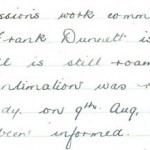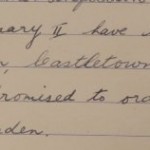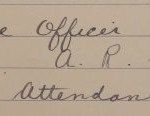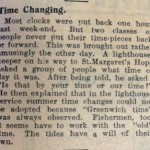On 14 August Winston Churchill and President Roosevelt signed the Atlantic Charter, a statement of ideal post-war aims, including a commitment to no territorial aggrandisement and the restoration of rights to those who had been deprived them, and freedom from fear or want. Meanwhile, Hitler ordered the last of Berlin’s Jews to be deported to concentration camps. In Britain on 15 August, the captured German spy Josef Jakobs became the last person to be executed at the Tower of London.

Poor Frank Dunnet was still not able to return to Brabster School, as reported last week. The School Log book records: “Frank Dunnet is still absent. The bull is still roaming at liberty, though intimation was received from Mr McHardy [the County Director of Education] on 9th August that the Police had been informed.”

Meanwhile in Stemster School, the children were tending their garden. “14th August: Boys (5) of Primary II have begun gardening. Mr Anderson, Castletown, called this afternoon and has promised to order barrow for the school garden.”
 Now that the Luftwaffe was committed to the invasion of Russia schools in the county experienced far fewer air raids than previously. Schools in and around Wick were still being disrupted by regular warnings, but they were now so commonplace as to hardly be worth a mention – as the following laconic entry from Staxigoe School log book shows: “15 August. Attendance Officer visited the school on Friday. A.R. Warning in the fore-noon. Attendance for week 96%.”
Now that the Luftwaffe was committed to the invasion of Russia schools in the county experienced far fewer air raids than previously. Schools in and around Wick were still being disrupted by regular warnings, but they were now so commonplace as to hardly be worth a mention – as the following laconic entry from Staxigoe School log book shows: “15 August. Attendance Officer visited the school on Friday. A.R. Warning in the fore-noon. Attendance for week 96%.”

The main danger to Caithness now came from the sea, in terms of unexploded mines washed ashore, or shells fired from naval ships, frequently British. On 12 August Wick coastguard reported: “The object reported at Brough has been examined and found to be part of an unexploded shell.”
 Finally this week, on the night of 10-11 August British Double Summer Time, by which the clocks were put forward two hours, came to an end; for the rest of the winter clocks would, confusingly, be set to regular summer time (i.e., just one hour ahead). But as the John O’Groat Journal noted, two classes of people were unaffected: “in the lighthouse service summer time changes could not be adopted because “Greenwich time” was always observed. Fishermen, too, it seems have to work with the “old” time. The tides have a will of their own.”
Finally this week, on the night of 10-11 August British Double Summer Time, by which the clocks were put forward two hours, came to an end; for the rest of the winter clocks would, confusingly, be set to regular summer time (i.e., just one hour ahead). But as the John O’Groat Journal noted, two classes of people were unaffected: “in the lighthouse service summer time changes could not be adopted because “Greenwich time” was always observed. Fishermen, too, it seems have to work with the “old” time. The tides have a will of their own.”
